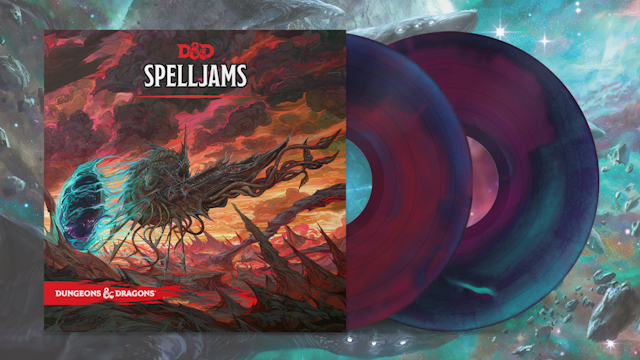The Decemberists’ Chris Funk on creating the first Dungeons & Dragons soundtrack
For The Drum’s Audio Deep Dive, we catch up with Chris Funk of indie-rock band The Decemberists about Dungeons & Dragons, Stranger Things and the creative process.

Chris Funk says ‘just get your projects done’
Kate Bush isn’t the only pop culture phenomenon experiencing a resurgence on the back of Stranger Things. Dungeons & Dragons (D&D) is also enjoying renewed popularity and is capitalizing on the moment with an album release inspired by its new Spelljammer: Adventures in Space module.
The double LP was produced The Decemberists’ multi-instrumentalist Chris Funk, who shares with The Drum his thoughts on the project and on why creatives need to slay their inner critic.
As a former dungeon master myself, this project speaks to me. How did you get into it?
I play D&D with some of the members of The Decemberists and started to get to know [parent company] Wizards of the Coast. I said: ‘Hey, if you ever need help with anything around the music part of Dungeons & Dragons, let me know. I’m your guy. I’m your nerd.’
[Famed game designer] Chris Perkins and I started coming up with the idea that [we would pick select] bands to write a song inspired by each chapter from the [game] module. We gave the bands a Cliff Notes version of each chapter. They were like: ‘Is this for a video game or a commercial?’ We said: ‘No, you are just using the [Spelljammer chapters] world as a song prompt.’ Everybody was like, top to bottom: ’This is the most fun I’ve had writing a song in a long time.’
The soundtrack has a Flash Gordon feel. How did you inspire the artists that participated, including Magic Sword, Shabazz Palaces and Osees?
Most people, even if they hadn’t played D&D, have heard of it. They’d seen Stranger Things or they’re like: ‘My friend is an actor and they played in Los Angeles.’ In terms of getting people inspired, there indeed was a brief that I wrote up as I was trying to be a dutiful music supervisor. There were some parameters, but really it was trusting the artists. A lot of brands and agencies go after musicians and there’s this like compulsion to overcorrect the music.
I used to do a lot of music supervision advertising work as a composer and as a supervisor. It was always frustrating to take notes from a creative director. I’ll never forget like one time this guy was like: ’I want to be able to hear the violin bow going over the strings and I want it to be an organic sound.’ We ended up picking the most synthesized string sound I’ve ever heard in my life. Trusting musicians, composers and people and not overthinking how music fits into something is really important.

Do you play D&D with anyone famous?
The lead singer and I always have a few games going, but we’re not exactly playing with Zack De La Roche from Against The Machine or something… My girlfriend’s daughter is [now playing though].
Did you feel any pressure to nail this soundtrack since you’re such a big D&D fan?
You do feel that pressure to deliver music for the world’s greatest role-playing game that I happen to be a fan of also. I felt a lot of pressure actually. I’m really proud of what came out.
Is there a Decemberists song that you ever thought, ’that’d be a good one for D&D’?
We were going to do an original one and the schedules didn’t line up. But we have an album called The Hazards of Love, which is a rock opera, basically. You can take any of those songs and pop them in there and write some new lyrics for sure.
What have you learned from creative process, through the years, that you could share with The Drum’s readers?
Work often because the song isn’t going to write itself. Create that time to do it. Also, work quickly. Just finish something and document it so you can come back to it and use it. There have been so many times where I’ve been like: ’I have this song in Dropbox and the bridge for that song could fit this new thing I’m working on right now.’
The last thing is, shut down your inner critic and get it done. I’ve been like: ‘Oh my god, this sucks.’ Put it down and walk away from it. Come back and finish it the next day. Then, at least you get it to a spot where it feels somewhat like a finished song or picture. You can work on stuff forever, right? You just have to know when to be like, this is a document of a period of a time in my life and don’t be so precious with it… Just finish it.
For more on the power of sound, check out The Drum’s Audio Deep Dive.

